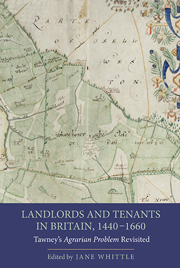Book contents
- Frontmatter
- Contents
- List of Figures
- List of Tables
- Abbreviations
- List of Contributors
- Acknowledgements
- Foreword
- Introduction: Tawney's Agrarian Problem Revisited
- 1 The Agrarian Problem, 1440–1520
- 2 Common Law and Manor Courts: Lords, Copyholders and Doing Justice in Early Tudor England
- 3 Negotiating Enclosure in Sixteenth-Century Yorkshire: The South Cave Dispute, 1530–1536
- 4 The Politics of Enclosure in Elizabethan England: Contesting ‘Neighbourship’ in Chinley (Derbyshire)
- 5 The Loss of Athelstan's Gift: The Politics of Popular Memory in Malmesbury, 1607–1633
- 6 In Search of the Scottish Agrarian Problem
- 7 The Transfer to Leasehold on Durham Cathedral Estate, 1541–1626
- 8 The Financial Rewards of Winning the Battle for Secure Customary Tenure
- 9 Risks and Rewards in Wasteland Enclosure: Lowland Lancashire c.1500–1650
- 10 Improving Landlords or Villains of the Piece? A Case Study of Early Seventeenth-Century Norfolk
- 11 The Agrarian Problem in Revolutionary England
- 12 Agrarian Capitalism and Merchant Capitalism: Tawney, Dobb, Brenner and Beyond
- Conclusions
- Select Bibliography
- Index
11 - The Agrarian Problem in Revolutionary England
Published online by Cambridge University Press: 05 September 2013
- Frontmatter
- Contents
- List of Figures
- List of Tables
- Abbreviations
- List of Contributors
- Acknowledgements
- Foreword
- Introduction: Tawney's Agrarian Problem Revisited
- 1 The Agrarian Problem, 1440–1520
- 2 Common Law and Manor Courts: Lords, Copyholders and Doing Justice in Early Tudor England
- 3 Negotiating Enclosure in Sixteenth-Century Yorkshire: The South Cave Dispute, 1530–1536
- 4 The Politics of Enclosure in Elizabethan England: Contesting ‘Neighbourship’ in Chinley (Derbyshire)
- 5 The Loss of Athelstan's Gift: The Politics of Popular Memory in Malmesbury, 1607–1633
- 6 In Search of the Scottish Agrarian Problem
- 7 The Transfer to Leasehold on Durham Cathedral Estate, 1541–1626
- 8 The Financial Rewards of Winning the Battle for Secure Customary Tenure
- 9 Risks and Rewards in Wasteland Enclosure: Lowland Lancashire c.1500–1650
- 10 Improving Landlords or Villains of the Piece? A Case Study of Early Seventeenth-Century Norfolk
- 11 The Agrarian Problem in Revolutionary England
- 12 Agrarian Capitalism and Merchant Capitalism: Tawney, Dobb, Brenner and Beyond
- Conclusions
- Select Bibliography
- Index
Summary
R. H. Tawney thought that the causes of the rural impoverishment, collapse of community, and domination of great landowners characteristic of his own lifetime lay in the English civil wars of the mid-seventeenth century and the decades that followed the Restoration of the monarchy in 1660. A key conclusion of The Agrarian Problem of the Sixteenth Century is that, despite the challenges they faced, the smallholders who made up the ‘intelligence of toiling England’ survived reasonably well into the seventeenth century largely because they could rely on the relief offered them by the royal prerogative courts. Indeed, in anticipation of the famous articles on the ‘rise of the gentry’ that Tawney wrote a quarter of a century later, The Agrarian Problem identifies the English ‘revolution’ as a triumph of the landowning class that demolished the institutional restraints, such as Chancery and Star Chamber, that had traditionally kept their rapacity at bay. Since the ‘good side of Absolute Monarchy was swept aside with the bad’, there was no longer any obstacle to ‘enclosure, evictions [and] rackrenting’ other than a not very sympathetic common law. ‘For a century and a half after the Revolution [the gentry] had what power a Government can have to make and ruin England as they please.’ If economic conditions made the new agrarian regime profitable, ‘legal causes decided by whom the profits should be enjoyed’.
- Type
- Chapter
- Information
- Landlords and Tenants in Britain, 1440-1660Tawney's 'Agrarian Problem' Revisited, pp. 183 - 199Publisher: Boydell & BrewerPrint publication year: 2013

